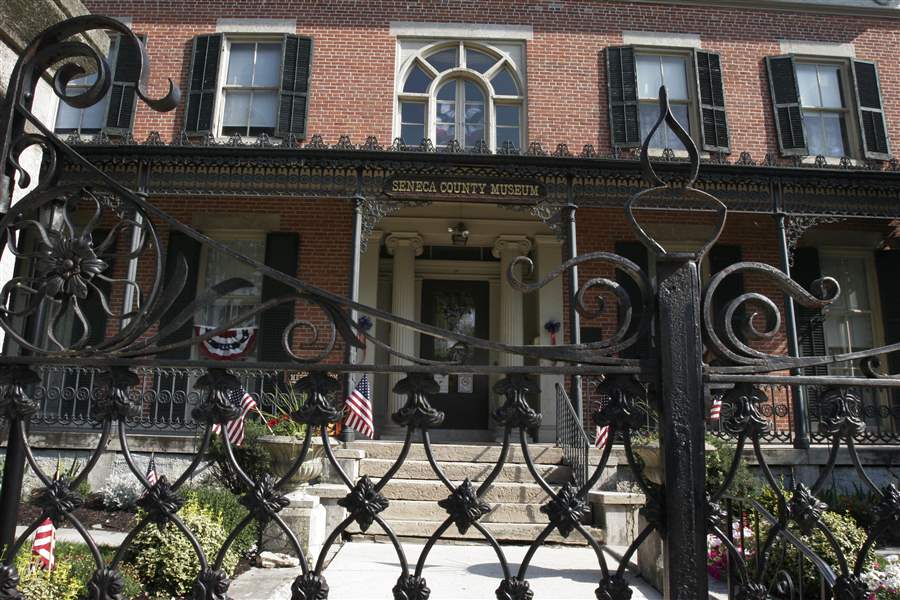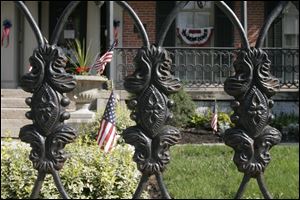
Seneca County to sell museum because of state budget cutbacks
5/13/2011
The Seneca County commissioners say they will sell the county museum and its contents to save money. Last year, the county spent $42,000 to operate the building.
The Blade
Buy This Image

The Seneca County commissioners say they will sell the county museum and its contents to save money. Last year, the county spent $42,000 to operate the building.
TIFFIN -- Six weeks ago, the Seneca County commissioners said they could not afford to renovate the 1884 courthouse in light of impending state budget cuts.
Thursday, they cited the same reason in announcing plans to close the Seneca County Museum and to sell the building and its contents.
"I think you will see the county going back to very basic services," Commissioner Jeff Wagner said after county Administrator Stacy Wilson read a statement that because of "recent budget cuts the county has already made and are reasonably anticipated in the future," the commissioners had "made the difficult decision to discontinue funding the museum operations. In addition, the board has decided to close the Seneca County Museum and to lawfully dispose of the contents."
The news, which came after no public discussion, was a shock to those who are involved with the museum and its foundation. Seneca County began its collection of local history artifacts in 1915 and moved into the Greek Revival home on Clay Street in 1942.
"I'm shocked. I'm president of the [museum] foundation and I didn't have a hint," said Rayella Engle, who was not at the commissioners' meeting. "That's like throwing your grandmother's things out and history down the stream. It's shocking and I feel really bad."
Foundation board member Theresa Sullivan, who was in attendance, said she had no idea the commissioners were thinking of closing the museum, which she said is ill-timed considering the new Civil War Museum of Ohio, which opened in downtown Tiffin earlier this year.
Lenora Livingston, who lives next door to the county museum, said closing it would be a detriment to Tiffin.
"People come here. They want to see the museum. The local school children come every year," she said. "It's the history of the county dating back a long ways."
Commissioner Ben Nutter said the closure is unfortunate but unavoidable in light of the pending elimination of local government funds from the state, as well as additional state mandates that the county will have to pay. Seneca County expects to lose $350,000 in local government funds in the first year and $700,000 the year after.
"In order to control expenses, you do that by eliminating debt and eliminating long-term expenses," Mr. Nutter said. "We're going to be in that mode -- getting rid of assets we are not using or don't have to have and paying down our debt and eliminating expenses that are not mandated by the state."
The county spent about $42,000 to operate the museum last year, which includes insurance and utilities.
Commissioner Dave Sauber said the board intends to use the money raised by selling the museum and its contents to reduce debt. Some items could be sold by auction locally, he said, while some of the more valuable items -- paintings and some antiques -- could be sold through New York auction houses.
The commissioners said they did not know the value of the inventory, although Museum Director Tonia Hoffert said the collection includes three Hudson River Valley paintings and a number of furnishings that were in the massive brick house when it was donated to the county in 1942 by Lynn Troxel, Sr.

The Seneca County Museum's collection includes items that were locally manufactured or have local significance.
She said the commissioners might close the museum because of budget cuts, but she too was stunned to learn they plan to close and sell it.
The extensive collection includes numerous items that were locally manufactured or have local significance such as a large collection of Tiffin Glass. Many items were donated by residents who wanted them to be shared with the community, she said.
"Once it's gone, it's gone," Ms. Hoffert said. "There are items in here that once they are sold off, you'll never find them again."
Mr. Sauber said the county had tried to work with the museum foundation over the last year, but that it was uninterested in taking over operations of the museum.
Mrs. Engle said she never had such a conversation with the commissioners.
"I feel very bad that they have not contacted me at all," she said. "Maybe they still will."
Also Thursday, commissioners met with Franklin Conaway, president of the Seneca County Courthouse and Downtown Redevelopment Group, for the first time since March 22, when the board said it could not proceed with a $7.99 million renovation of the historic courthouse because of the state budget.
Mr. Conaway asked the commissioners to give the development group a statement spelling out its financial condition and its current debt service capacity. With that information, he said, the group plans to come back with a recommendation for how to proceed with the project -- if it's still feasible.
The county has been approved for a low-interest, 30-year, $5 million loan from the U.S. Department of Agriculture as well as a $400,000 grant from the Ohio Department of Development for the courthouse project.
Tiffin attorney Dean Henry told the board he would love to see that money come to Seneca County.
He urged the commissioners to stay open-minded to the development group's proposal.
"From a long-term economic standpoint, this is a great time to be borrowing money," Mr. Henry said, adding, "These are tough economic times, but in the history of this country some of the greatest infrastructure projects that have ever been built and that are still standing were done during the Great Depression."
Contact Jennifer Feehan at: jfeehan@theblade.com or 419-724-6129.